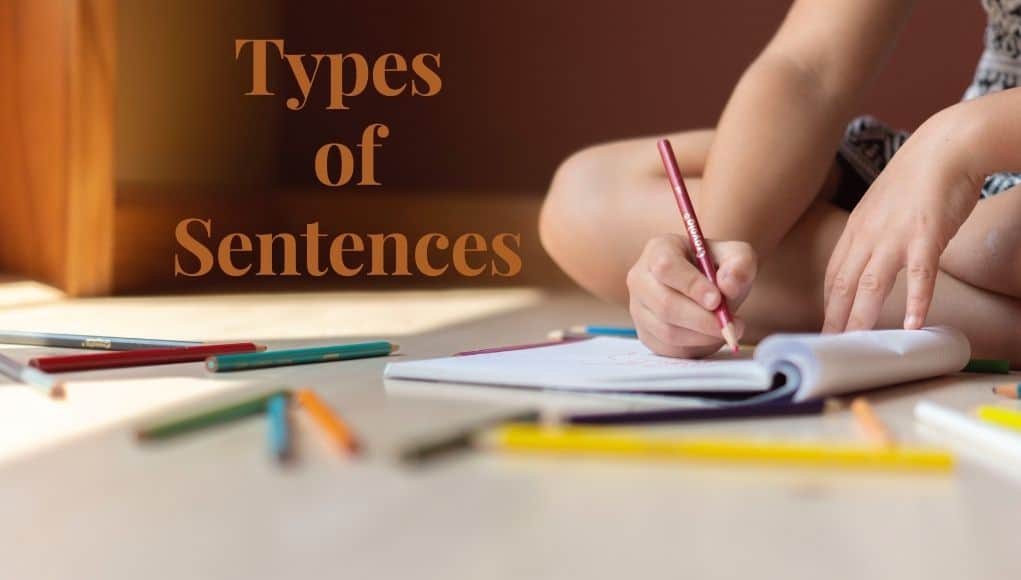A word or a group of words having meaning in a given context is called a sentence.
When we express ourselves using the English language as our medium, we use various types of sentences while speaking.
Each sentence has its own identity and patterns. Sentences are four types DECLARATIVE, INTERROGATIVE, IMPERATIVE, and EXCLAMATORY.
Don’t be afraid of such fancy names. They are simple and easy to understand.
If you want to know more about the English language then you can focus on the best YouTube channels, letter writing techniques, or how to speak more fluently in English.
Table of Contents
Types of Sentences

What is a DECLARATIVE/ ASSERTIVE sentence?
A declarative or Assertive sentence expresses facts or ideas.
On the other hand, it states, declares, or claims something. We use it in our daily conversations or writing scripts.
It takes a full stop or period at the end. We can construct these sentences in negative and positive ways.
However, changing the positive sentence to a negative, we need to take the help of the ‘Do’ verb (if you have used only one verb in your sentence).
On the contrary, if you use the helping verb and the main verb in your sentence, you need not use the ‘Do’ verb to make the sentence negative.
Here are a few examples:
I know him. (Positive)
I don’t know him. (Negative)
He follows the rules. (Positive)
He does not follow the rules. (Negative)
What is an INTERROGATIVE/ QUESTION sentence?
An interrogative sentence is a question sentence. We use these sentences while asking questions or getting information from someone.
It is easy to recognize these sentences because it takes a question mark (?) at the end. We need to understand the patterns of sentences while framing the question sentences.
Question sentences can be structured in two ways, using (who, which, what, when, whom, why, and how) or using helping verbs (do, does, am, is, are, was, were, will, shall, have, has, had, and so on) at the beginning of the sentence.
Question sentences that begin with w/h words, such questions demand an answer in sentence forms. However, helping verb questions can be answered by Yes/No responses.
While framing the questions, you should not forget to place the verb before the subject.
Here are a few examples:
What are you doing? (I am reading a book)
Where are you going? (I am going to school)
Do you know the address? (Yes)
Have you done the work? (No)
What is an Imperative sentence?
We use these sentences while we are expressing command, order, request, advice, or desire.
These sentences don’t take the subject that has to be understood by sense. It starts with a verb, and ends with a period or full stop.
Here are a few examples:
Shut the door.
Bring a glass of water.
Please give me a glass of water.
Don’t make noise.
What is an Exclamatory sentence?
We use Exclamatory sentences while expressing sudden feelings, emotions, excitement, anger, and surprise, and it ends with an exclamation mark (!).
Sometimes declarative sentence delivers sudden emotion and ends with an exclamation mark. In such conditions, we should consider it as an Exclamatory sentence.
Using an exclamation mark, we can change the declarative sentence into an exclamatory sentence. But it is better to write some strong words instead of using the exclamation point of ‘very’ or ‘so’ in your writing.
Sometimes people use exclamation marks (!) two times in a single sentence, but it does not convey the extra meaning that marks the reader’s interpretation.
Here are a few examples:
What a beautiful picture!
How beautiful the bird looks!
What a fine day it has been!
Alas! We have lost the match.
Conclusion
I believe that this script would clear all your doubts about the types of sentences. However, it is one of the basic principles of language learning techniques, so you need to be careful and patient while learning.
Share your view and thought via the comment section and your experiences.

Really an amazing plateform to learn and improve English language. Strongly recommend for beginners.
Thanks for your comment that would inspire me a lot to work further. I would request you to look into my other posts as well.
Good work dude. Keep up the good work.
Thank you so much.